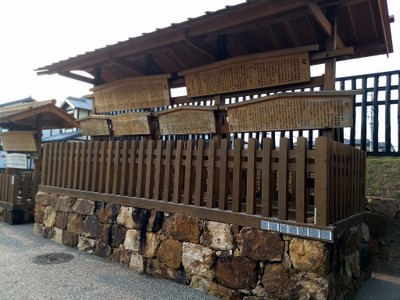Difference between revisions of "Kosatsu"
From SamuraiWiki
Jump to navigationJump to searchm |
|||
| (4 intermediate revisions by 2 users not shown) | |||
| Line 1: | Line 1: | ||
| − | Japanese:高札( | + | [[File:Kosatsu.jpg|right|thumb|400px|A restored ''kôsatsuba'' at [[Futagawa-juku]] along the [[Tokaido|Tôkaidô]].]] |
| + | *''Japanese'': 高札 ''(kousatsu)'' or 制札 ''(seisatsu)'' | ||
| + | ''Kôsatsu'' were signboards hung in [[Edo period]] towns to notify people of local laws, ordinances, and announcements. | ||
| − | + | In post-stations (''[[shukuba]]''), signboards often also listed the costs of various services within the town, including the prices for hiring porters or [[denma|post-horses]] to carry luggage as far as the next station or river-crossing.<ref>Gallery labels, Futagawa-juku honjin shiryôkan.[https://www.flickr.com/photos/toranosuke/45579137824/sizes/4k/]</ref> | |
==References== | ==References== | ||
| − | [ | + | *Plaque on-site at restored ''kôsatsuba'', Futagawa-juku, Toyohashi, Aichi.[https://www.flickr.com/photos/toranosuke/46302537891/sizes/l/] |
| + | <references/> | ||
{{stub}} | {{stub}} | ||
| + | |||
| + | [[Category:Terminology]] | ||
| + | [[Category:Edo Period]] | ||
Latest revision as of 09:56, 22 May 2020
- Japanese: 高札 (kousatsu) or 制札 (seisatsu)
Kôsatsu were signboards hung in Edo period towns to notify people of local laws, ordinances, and announcements.
In post-stations (shukuba), signboards often also listed the costs of various services within the town, including the prices for hiring porters or post-horses to carry luggage as far as the next station or river-crossing.[1]
References
- Plaque on-site at restored kôsatsuba, Futagawa-juku, Toyohashi, Aichi.[2]
